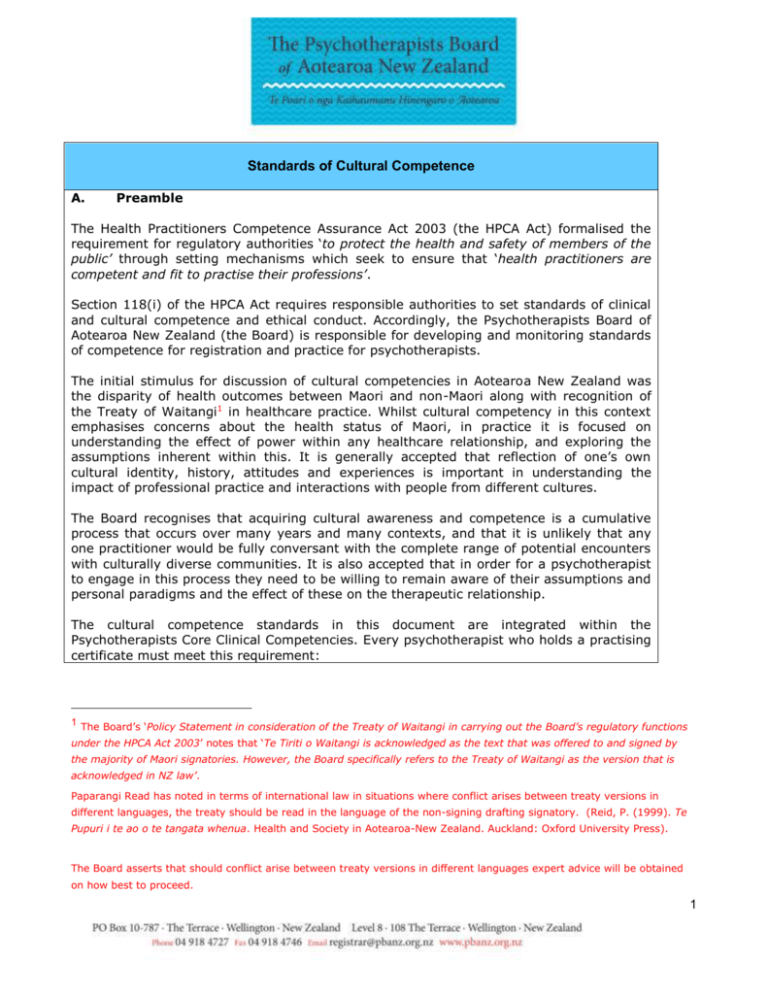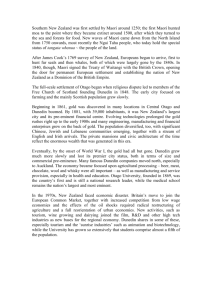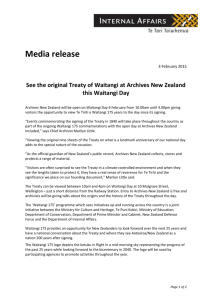Psychotherapists Standards of Cultural Competence
advertisement

Standards of Cultural Competence A. Preamble The Health Practitioners Competence Assurance Act 2003 (the HPCA Act) formalised the requirement for regulatory authorities ‘to protect the health and safety of members of the public’ through setting mechanisms which seek to ensure that ‘health practitioners are competent and fit to practise their professions’. Section 118(i) of the HPCA Act requires responsible authorities to set standards of clinical and cultural competence and ethical conduct. Accordingly, the Psychotherapists Board of Aotearoa New Zealand (the Board) is responsible for developing and monitoring standards of competence for registration and practice for psychotherapists. The initial stimulus for discussion of cultural competencies in Aotearoa New Zealand was the disparity of health outcomes between Maori and non-Maori along with recognition of the Treaty of Waitangi1 in healthcare practice. Whilst cultural competency in this context emphasises concerns about the health status of Maori, in practice it is focused on understanding the effect of power within any healthcare relationship, and exploring the assumptions inherent within this. It is generally accepted that reflection of one’s own cultural identity, history, attitudes and experiences is important in understanding the impact of professional practice and interactions with people from different cultures. The Board recognises that acquiring cultural awareness and competence is a cumulative process that occurs over many years and many contexts, and that it is unlikely that any one practitioner would be fully conversant with the complete range of potential encounters with culturally diverse communities. It is also accepted that in order for a psychotherapist to engage in this process they need to be willing to remain aware of their assumptions and personal paradigms and the effect of these on the therapeutic relationship. The cultural competence standards in this document are integrated within the Psychotherapists Core Clinical Competencies. Every psychotherapist who holds a practising certificate must meet this requirement: 1 The Board’s ‘Policy Statement in consideration of the Treaty of Waitangi in carrying out the Board’s regulatory functions under the HPCA Act 2003’ notes that ‘Te Tiriti o Waitangi is acknowledged as the text that was offered to and signed by the majority of Maori signatories. However, the Board specifically refers to the Treaty of Waitangi as the version that is acknowledged in NZ law’. Paparangi Read has noted in terms of international law in situations where conflict arises between treaty versions in different languages, the treaty should be read in the language of the non-signing drafting signatory. (Reid, P. (1999). Te Pupuri i te ao o te tangata whenua. Health and Society in Aotearoa-New Zealand. Auckland: Oxford University Press). The Board asserts that should conflict arise between treaty versions in different languages expert advice will be obtained on how best to proceed. 1 ‘All psychotherapists will be knowledgeable of culturally safe practices, and familiar with the Treaty of Waitangi and be able to integrate these into their practice in ways that ensure that issues of diversity and equality are valued, upheld and promoted.’ 2 The Board recognises that cultural competence, clinical competence and ethical conduct are integral to professional psychotherapy practice. Most theories of psychotherapy that are practised in New Zealand emerged from a European or Western worldview. Maori have an established an ordered structure that promotes the health and wellbeing of those within Maori society. These constructs remain relevant as a way to view and understand the human person, and the relationships between all living things, the spiritual, physical, and emotional-psychological aspects of life. This document has been prepared with these points in mind. 2 http://www.pbanz.org.nz/index.php?PsychotherapistCoreClinicalCompetencies 2 B Definitions Dr Paratene Ngata3 used the Chinese proverb ‘Culture is the water in which the fish swims’ to illustrate the concept that culture is all the many ways that people define, perceive or see themselves and others, and the world they live in. In these Standards the Board upholds that cultural competence: Concerns the attitudes, the awareness, the knowledge and the skills to discern the cultural reality that is likely to have the greatest significance in a specific context, recognising that culture is a determinant of health status; Includes recognising that personal identity is formed and influenced throughout life by the cultures we live within, and well-being is affected by relationship with, or outside of, dominant cultural values and beliefs; Includes an understanding that the concept of culture extends beyond ethnicity and that people may identify with several cultural or social groups. In the definition of cultural competence, the Board acknowledges the diversity of “culture”, and in this work, notes that culture is part of, but not limited to, the human experience of: Age; Disability; Distinctive groups and organisations4; Ethnicity; Gender; Migrant experience; Occupation; Political beliefs; Religion and/or spiritual beliefs; Sexual orientation; Social economic status; and A culturally competent psychotherapist will recognise: The status of Maori and Pakeha as partners to the Treaty of Waitangi; That Aotearoa New Zealand has a culturally diverse population and how that diversity impacts on healthcare service, access and delivery; How cultural and personal identity influences professional practice and that the 3 Dr Paratene Ngata, Hui Whakaoranga, 1984. 4 Organisational culture is the psychology, attitudes, experiences, beliefs and values of an organisation. A specific collection of values and norms that are shared by people and groups within an organisation that control the way they interact with each other and with stakeholders outside the organisation. 3 language and concepts used are culturally derived and may have different meaning for different people; That cultural competence is fundamental in assisting clients to achieve their own optimal health outcomes. 4 C The Standards The Board expects that as a culturally competent psychotherapist, you are able to apply the following standards in your practice. To work competently with clients, a psychotherapist needs to demonstrate appropriate therapeutic attitudes, awareness, knowledge and skills. These are described below. 1. Attitudes As a psychotherapist you will be: 1.1 Willing to understand your cultural values and the influence of your own identity and cultural bias on your interactions with clients; 1.2 Able to understand your impact as the bearer of your own culture, history, attitudes and life experiences and the response other people have to these factors; 1.3 Able to examine your practice carefully, recognising the power relationship in psychotherapy is biased towards the provider of the health service; 1.4 Committed to the ongoing development of your own cultural awareness and practices; 1.5 Mindful of the need to avoid imposing your own culture and values on clients, colleagues and members of the public; 1.6 Willing to appropriately address the cultural bias of individual colleagues or systemic bias within healthcare services, where there is a potential negative impact on people; 1.7 Willing to consult appropriate cultural advisors and refer clients on to others, if one’s own attitudes limit therapeutic effectiveness. 2. Awareness As a psychotherapist you will be: 2.1 Aware that cultural factors influence health and illness; 2.2 Aware of the limitations of your knowledge; 2.3 Aware of how both you and your client’s cultural and personal history, and cultural identification shape personal values, assumptions, judgements and biases. This includes cultural heritage, age, disability, affiliation with distinctive groups and 5 organisational affiliation, ethnicity, gender, migrant experience, occupation, political beliefs, religion and/or spiritual beliefs, sexual orientation, and socio economic status. 2.4 Aware that general cultural information may not apply to specific clients and clients should not be thought of as a stereotype; 2.5 Respectful of your clients and willing to gain understanding of their personal and cultural beliefs, values and practices; 2.6 Able to understand that client’s interactions with the healthcare system, and their health care preferences, are influenced by cultural identity, beliefs, values and practices and their perceptions of health and illness; 2.7 Able to recognise the impact of stigmatisation due to personal/cultural difference and invite clients to express and understand their personal and cultural identity using their own language and concepts; 2.8 Able to recognise that personal and cultural identities are expressed by individuals and groups in different ways. 3. Knowledge As a psychotherapist you will have: 3.1 Knowledge of how psychotherapy theory and practices, methods of inquiry, and research paradigms are historically and culturally embedded and how they have changed over time as society’s values and political priorities shift; 3.2 Knowledge of the history and manifestation of oppression, prejudice, and discrimination as it impacts both on you and clients; 3.3 Knowledge of socio-political influences5 that impinge on the lives of identified groups6; 3.4 An understanding of structural and economic power imbalances and how these impact on health outcomes; 3.5 Knowledge of culture-specific diagnostic categories, and the potential dangers of using them on individuals from cultures that differ from the group that defined these categories; 3.6 Knowledge of the effect of dominant cultural values when these are used to diagnose, pathologise or to compare those who do not identify with or live according to these values; 5 For example: poverty, stereotyping, stigmatisation, land and language loss, and marginalisation 6 For example: identity formation, developmental outcomes and manifestations of mental illness. 6 3.7 Knowledge of various appropriate culture-specific approaches; 3.8 Knowledge of New Zealand family structures including whanau, hapu, iwi, and other family structures and how they differ across identified groups; 3.9 Knowledge of New Zealand schooling and education systems including kura kaupapa, kohanga reo, and other educational systems and how they differ across identified groups; 3.10 Knowledge of effects of heterosexual cultural dominance and awareness of guidelines for culturally competent practice with people who identify as gay, lesbian, or bisexual7; 3.11 Knowledge of effects of cultural attitudes on gender identity development and awareness of guidelines for culturally competent practice with people who identity as intersex or transgendered8; 3.12 Knowledge of the Board’s Standards of Ethical Conduct, Core Clinical Competencies, the Treaty of Waitangi, relevant legislation, and their application in practice. 4. Skills As a psychotherapist you will have the ability to: 4.1 Speak the English language as spoken in New Zealand (NZ Colloquialisms), and/or in te reo Maori, and/or in New Zealand sign language, as the three official languages of the country; 4.2 Encourage clients to use their own language, meanings and metaphors in describing themselves and their experiences; 4.3 Establish rapport with clients of other cultures and with those who may be in the process of developing cultural or social identity; 4.4 Recognise and work appropriately with a client’s cultural perspectives, beliefs and values in the therapeutic process; 4.5 Establish rapport and convey empathy in culturally sensitive ways for example, taking into account culturally influenced interpretations of language and metaphor, verbal and nonverbal expression, personal space, ways of interaction and cultural values; 4.6 Explore issues of difference between yourself and your client and to incorporate Refer to the Guidelines developed by the Division 44/ Committee on Lesbian, Gay, and Bisexual Concerns Joint Task Force. Adopted by the American Psychological Association Council of Representatives February 26, 2000. 8 Refer to The Harry Benjamin International Gender Dysphoria Association's Standards Of Care For Gender Identity Disorders, Sixth Version. February, 2001 and The Intersex Society of North America (ISNA) at www.isna.org 7 7 these issues into an effective therapeutic process; 4.7 Recognise when your actions and/or language may not be acceptable or might be offensive to your clients; 4.8 Determine when to discuss the potential benefit of other personal and cultural supports with the client; 4.9 Work cooperatively with others in the client’s culture; their family, social networks, other professionals and other community resource people where this is desired by the client and does not conflict with other clinical or ethical requirements; 4.10 Engage with clients from other cultures, recognising that their verbal and nonverbal communication styles may differ from your own; 4.11 Work effectively with interpreters when required; 4.12 Recognise the impact for clients, of living within a society that does not reflect their own culture and personal identity; 4.13 Recognise the inherent power dynamic of living within a dominant culture that is different from a client’s personal or cultural identity; 4.14 Engage in relevant cultural training; 4.15 Seek advice and guidance, and engage in cultural or other specific supervision to better understand a client’s personal and cultural identity; 4.16 Conduct supervision in a culturally competent manner for the benefit of the supervisee and their client, and yourself as supervisor. References The Psychotherapists Board of Aotearoa New Zealand has referred to other Regulatory Authority’s statements in the development of these Standards and would especially like to acknowledge the work of the following: Medical Council of New Zealand Statement on cultural competence, August 2006 Statement on best practices when providing care to Māori patients and their whānau, August 2006 Best health outcomes for Maori: Practice implications, October 2006 Best health outcomes for Pacific Peoples: Practice implications, May 2010. Nursing Council of New Zealand Guidelines for Cultural Safety the treaty of Waitangi and Maori Health in Nursing Education and Practice, March 2009. 8 Pharmacy Council of New Zealand Statement on Cultural Competence, January 2011. New Zealand Psychologists Board Cultural Competencies, May 2006 Other references Durie, Mason ‘Cultural Competence and Medical Practice in New Zealand’ paper presented to the Australian and New Zealand Boards and Councils Conference, Wellington, New Zealand, November 2001. Read, Parangi (1999). Te Pupuri i te ao o te tangata whenua. Health and Society in Aotearoa-New Zealand. Auckland: Oxford University Press. Useful websites http://www.hrsa.gov/culturalcompetence/measures/sectionii.htm http://www.pbanz.org.nz/index.php?PsychotherapistCoreClinicalCompetencies Other useful guidelines and statements Committee on Lesbian, Gay, and Bisexual Concerns Joint Task Force. Adopted by the American Psychological Association Council of Representatives February 26, 2000. Cultural Competency: Developments for Health Professionals Mauri Ora Associates November 2007 Health resources and Services Administration Study on Measuring Cultural Competence in Healthcare Delivery Settings US Department of Health and Human Resources. September 2001. The Maori patient in your practice - Guidelines on Maori Cultural Competencies for Providers. ACC. July 2008 The Harry Benjamin International Gender Dysphoria Association's Standards Of Care For Gender Identity Disorders, Sixth Version. February, 2001 and The Intersex Society of North America (ISNA) at www.isna.org. The Board would like to thank the Cultural Competence Advisory Committee for its assistance in drafting this document. Approved December 2011 9






